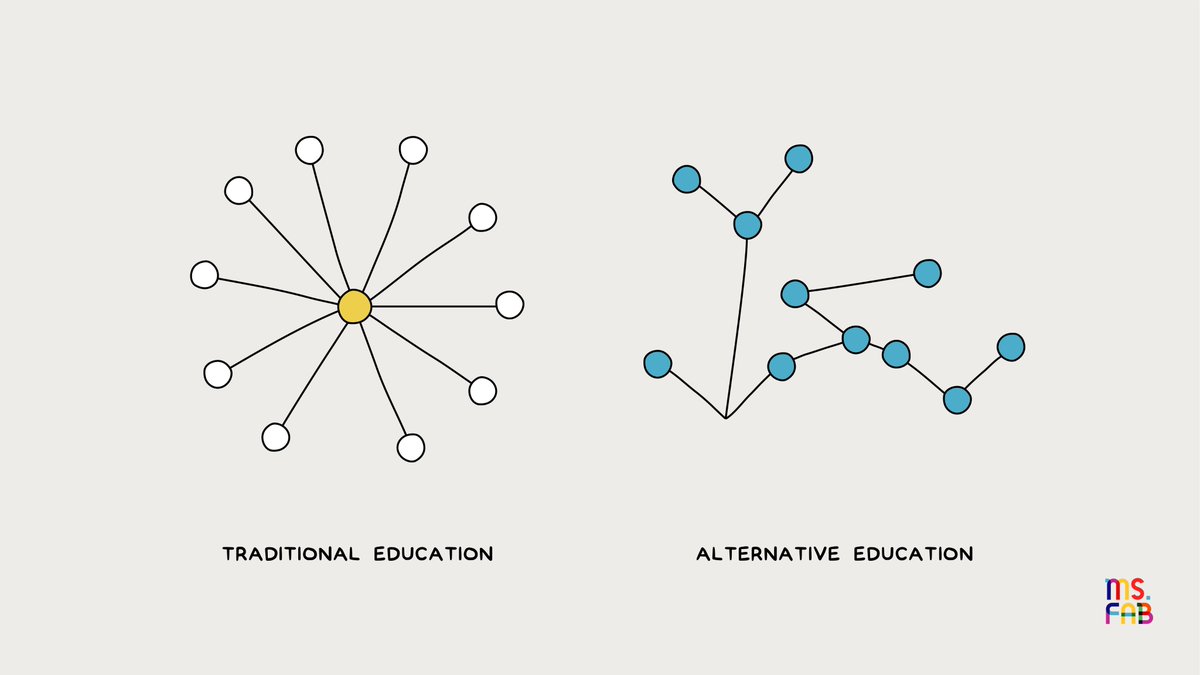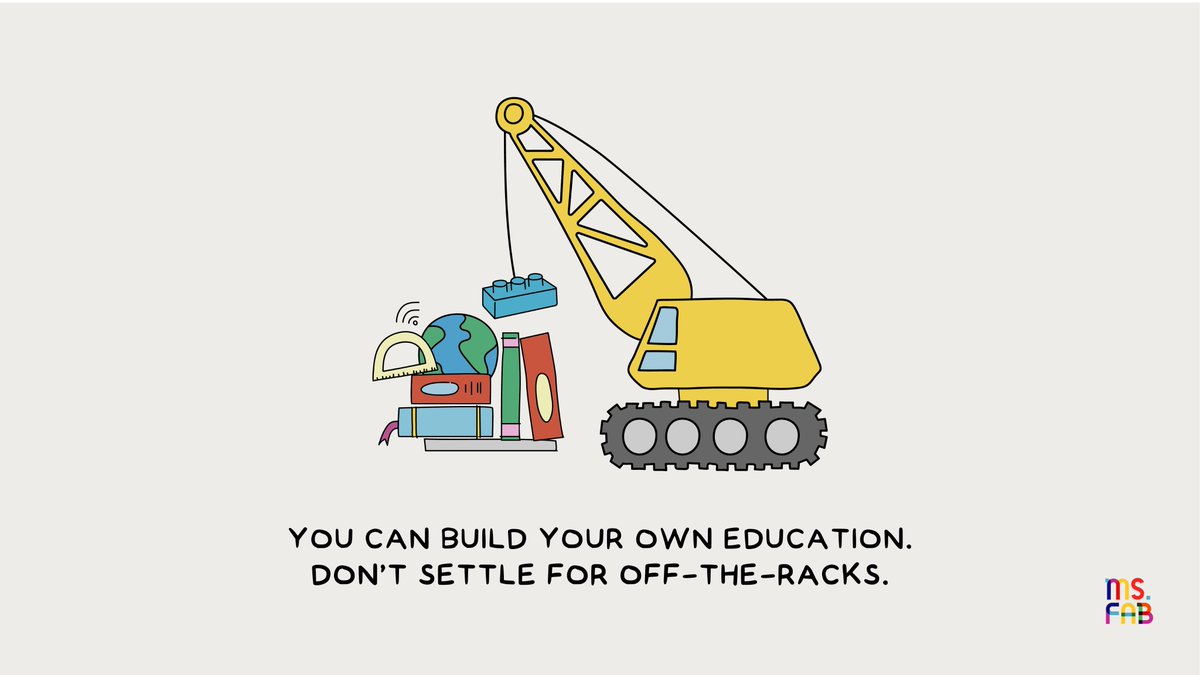7 dangerous lessons taught in schools:
John Taylor Gatto was a celebrated educator, named New York City’s Teacher of the Year three times in a row.
But after 30 years in the school system, he quit.
He was tired of teaching a curriculum that he saw harm many kids.
https://www.educationrevolution.org/blog/i-quit-i-think/">https://www.educationrevolution.org/blog/i-qu...
But after 30 years in the school system, he quit.
He was tired of teaching a curriculum that he saw harm many kids.
https://www.educationrevolution.org/blog/i-quit-i-think/">https://www.educationrevolution.org/blog/i-qu...
After quitting, Gatto wrote “Dumbing Us Down: The Hidden Curriculum of Compulsory Schooling.”
In this book, Gatto argued that schools force educators to teach kids 7 dangerous lessons.
Let’s unpack each one https://abs.twimg.com/emoji/v2/... draggable="false" alt="👇🏼" title="Rug van hand met omlaag wijzende wijsvinger (licht getinte huidskleur)" aria-label="Emoji: Rug van hand met omlaag wijzende wijsvinger (licht getinte huidskleur)">
https://abs.twimg.com/emoji/v2/... draggable="false" alt="👇🏼" title="Rug van hand met omlaag wijzende wijsvinger (licht getinte huidskleur)" aria-label="Emoji: Rug van hand met omlaag wijzende wijsvinger (licht getinte huidskleur)">
In this book, Gatto argued that schools force educators to teach kids 7 dangerous lessons.
Let’s unpack each one
Lesson 1: Confusion
School sequences are crazy. They don& #39;t help kids build a coherent picture of the world.
Students learn trigonometry but never get a chance to build anything.
They miss the chance to see how a hypotenuse applies, like when designing a house.
School sequences are crazy. They don& #39;t help kids build a coherent picture of the world.
Students learn trigonometry but never get a chance to build anything.
They miss the chance to see how a hypotenuse applies, like when designing a house.
In Gatto’s words, “Everything I teach is out of context.”
No wonder kids are confused about how things fit together.
This results in countless students graduating with a volume of academic junk that doesn’t prepare them for the future.
No wonder kids are confused about how things fit together.
This results in countless students graduating with a volume of academic junk that doesn’t prepare them for the future.
Lesson 2: Class Position
“Schools teach that students must stay in the class where they belong. Everyone has a proper place in the pyramid.” @realjohngatto
Kids learn to stay put, mature at the same rate as everyone else, and fit the mold of the model student.
“Schools teach that students must stay in the class where they belong. Everyone has a proper place in the pyramid.” @realjohngatto
Kids learn to stay put, mature at the same rate as everyone else, and fit the mold of the model student.
Student. Teacher. Star of the Week. Valedictorian.
School has a neat category for everyone, making each person’s position clear.
Kids are encouraged to seek status, compete, and please adults, instead of learning and collaborating together.
School has a neat category for everyone, making each person’s position clear.
Kids are encouraged to seek status, compete, and please adults, instead of learning and collaborating together.
Lesson 3: Indifference
Kids learn “not to care about anything too much,” Gatto says.
As soon as the bell rings, kids are forced to turn their interests “on and off like a light switch.”
Kids learn “not to care about anything too much,” Gatto says.
As soon as the bell rings, kids are forced to turn their interests “on and off like a light switch.”
When a unit is finished, students are expected to stop studying the previous subject, no matter how much they liked it.
Kids can& #39;t follow their obsessions or dive deep into topics they love.
Those who do get left behind.
Kids can& #39;t follow their obsessions or dive deep into topics they love.
Those who do get left behind.
Lesson 4: Emotional Dependency
Kids learn to rely on teachers to tell them *how* they should feel.
As Gatto says:
“By using stars and red checks; smiles and frowns; prizes and punishments; I force children to become emotionally dependent upon my praise.”
Kids learn to rely on teachers to tell them *how* they should feel.
As Gatto says:
“By using stars and red checks; smiles and frowns; prizes and punishments; I force children to become emotionally dependent upon my praise.”
Consider a teacher’s body language. It’s one of our most powerful tools.
Warm and welcoming, stern and closed off.
Students are taught to feel what their teachers want them to feel.
They have no space to develop emotional independence.
Warm and welcoming, stern and closed off.
Students are taught to feel what their teachers want them to feel.
They have no space to develop emotional independence.
Lesson 5: Intellectual Dependency
Kids miss the chance to think for themselves and develop their *own* perspectives.
“Good students wait for a teacher to tell them what to do,” as Gatto says.
Kids learn to wait for other people to make the meanings of their lives.
Kids miss the chance to think for themselves and develop their *own* perspectives.
“Good students wait for a teacher to tell them what to do,” as Gatto says.
Kids learn to wait for other people to make the meanings of their lives.
Kids get labeled as “problem children" when they do things their own way or ask hard questions.
They have little room to develop their own ideas.
Instead, kids are rewarded for championing the ideals of their teachers, whatever those might be.
They have little room to develop their own ideas.
Instead, kids are rewarded for championing the ideals of their teachers, whatever those might be.
Lesson 6: Provisional Self-esteem
Kids learn that their worth comes from what a professional thinks of them.
Report cards, grades, and tests teach kids that they "should not trust themselves or their parents but should instead rely on the evaluation of certified officials.”
Kids learn that their worth comes from what a professional thinks of them.
Report cards, grades, and tests teach kids that they "should not trust themselves or their parents but should instead rely on the evaluation of certified officials.”
In the past, kids did most of their learning at home, which meant different kids brought unique perspectives to the classroom.
Now, parents are discouraged from getting too involved.
Some kids even get shamed for holding beliefs that don’t align with state-approved curricula.
Now, parents are discouraged from getting too involved.
Some kids even get shamed for holding beliefs that don’t align with state-approved curricula.
Lesson 7: One Can’t Hide
At school, kids are always watched and under constant surveillance.
They have no privacy, no personal space, and few rights.
As a result, kids can& #39;t develop autonomy, which leads to problem like overusing screens. https://twitter.com/anafabrega11/status/1471892813726064644">https://twitter.com/anafabreg...
At school, kids are always watched and under constant surveillance.
They have no privacy, no personal space, and few rights.
As a result, kids can& #39;t develop autonomy, which leads to problem like overusing screens. https://twitter.com/anafabrega11/status/1471892813726064644">https://twitter.com/anafabreg...
People discover creative solutions when they have the freedom to experiment, fail, and try again.
But when kids are constantly evaluated, they can’t develop this skill.
And in school, they’re always under the watchful eye of adults who are quick to correct them.
But when kids are constantly evaluated, they can’t develop this skill.
And in school, they’re always under the watchful eye of adults who are quick to correct them.
Of course, Gatto’s point isn’t that every kid experiences each of these problems.
Or that all teachers fall into every trap.
Instead, his point is that the education system as a whole tends to teach these unhelpful lessons.
Or that all teachers fall into every trap.
Instead, his point is that the education system as a whole tends to teach these unhelpful lessons.
Ultimately, teachers aren’t to blame. Many of us started for the right reasons.
But the incentives of school nudge us in the wrong direction.
No matter how hard we resist, the system takes its toll, and we start developing counterproductive habits as educators.
But the incentives of school nudge us in the wrong direction.
No matter how hard we resist, the system takes its toll, and we start developing counterproductive habits as educators.
I certainly felt the force of this unhealthy system as a teacher—and most teachers I know feel it too.
After working in schools for years, I also saw how the system resisted change.
That’s the reason I left to explore options outside of traditional school.
After working in schools for years, I also saw how the system resisted change.
That’s the reason I left to explore options outside of traditional school.
Schools are so broken partly because they’re so centralized.
Most of them are run by the state. Even private schools often use the same framework.
One flaw in the model flows out to impact nearly every kid in America.
Most of them are run by the state. Even private schools often use the same framework.
One flaw in the model flows out to impact nearly every kid in America.
To decentralize education, we need many edu companies trying different tactics.
We need innovators and independent thinkers experimenting with new ideas.
And we need parents and kids willing to take risks.
We need innovators and independent thinkers experimenting with new ideas.
And we need parents and kids willing to take risks.
That’s why I’m so bullish on alternative education.
It’s not about reforming the system.
It’s about exiting the system and building many new and better options.
That means returning to old wisdom, involving the family, and using technology to help.
It’s not about reforming the system.
It’s about exiting the system and building many new and better options.
That means returning to old wisdom, involving the family, and using technology to help.
Frustrated with traditional school, many parents see the promise of this approach.
They’re cobbling together their own solutions:
Homeschooling, local tutors, classes on @galileoxp and @khanacademy, team problem-solving with @synthesischool, etc.
They’re cobbling together their own solutions:
Homeschooling, local tutors, classes on @galileoxp and @khanacademy, team problem-solving with @synthesischool, etc.
But as many opportunities as there are today, we need even more.
We need more educational startups and more entrepreneurial teachers.
We need more people who’re fed up with the bureaucracy of school to step up so we can help kids prepare for a successful future.
We need more educational startups and more entrepreneurial teachers.
We need more people who’re fed up with the bureaucracy of school to step up so we can help kids prepare for a successful future.
If your school works well for you and your kids, that’s great!
But if Gatto’s points resonated with you like they did with me, then this is your invitation to try something new.
But if Gatto’s points resonated with you like they did with me, then this is your invitation to try something new.
I explore ideas like this in Fab Fridays, my newsletter on childhood education with a twist + new ways to learn.
Subscribe below! https://abs.twimg.com/emoji/v2/... draggable="false" alt="🤸🏼" title="Persoon die een radslag doet (licht getinte huidskleur)" aria-label="Emoji: Persoon die een radslag doet (licht getinte huidskleur)"> https://afabrega.com/newsletter ">https://afabrega.com/newslette...
https://abs.twimg.com/emoji/v2/... draggable="false" alt="🤸🏼" title="Persoon die een radslag doet (licht getinte huidskleur)" aria-label="Emoji: Persoon die een radslag doet (licht getinte huidskleur)"> https://afabrega.com/newsletter ">https://afabrega.com/newslette...
Subscribe below!

 Read on Twitter
Read on Twitter



